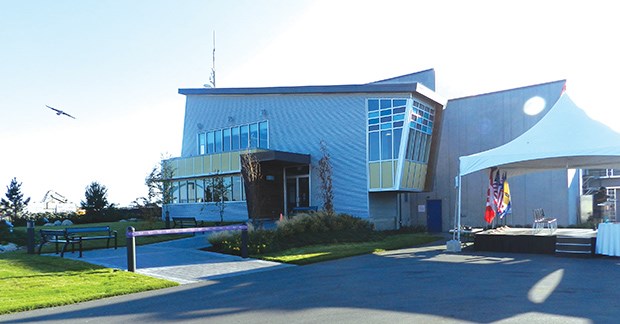To an outsider, Paul Sellew could pass for a big time magician worthy of a massive marquee on the Las Vegas Strip.
Why?
Because, despite his casual, conservative appearance and manner, with a simple line up of waste trucks full of organic material, he is transforming pizza crusts, apple cores and yard waste into not only rich compost — that’s an old trick — but power, as well.
It’s an act Sellew, CEO and founder of Harvest Power, and his staff have been performing since Harvest Power opened its Energy Garden in east Richmond and started accepting “green” waste at what is billed as the largest commercial-scale high solids anaerobic digester in North America.
That’s where city officials and politicians were on hand early Thursday morning for the sprawling facility’s official opening and tour.
“This facility represents the innovation, passion and commitment required to usher in the future of organics management,” said Sellew.
“We are excited to continue our partnership with Metro Vancouver and the City of Richmond community to cost-effectively convert organic materials once destined for the landfill into clean energy and compost products.”
The “magical” component of turning the waste into power comes through anaerobic digestion, something Sellew said is similar to what takes place in a cow’s stomach.
Biogas is produced by bacteria breaking down the incoming waste into a mixture of methane and carbon dioxide which is burned in a generator to produce electricity.
According to Harvest Power, the plant produces enough energy for 900 homes a year — power it sells to BC Hydro.
Plus, hundreds of thousands of cubic metres of soil products — from potting soil to top soil — are also produced as byproduct.
The plant is right for the time, as more and more communities look for “green” solutions to organic materials that would otherwise end up in a landfill, said Richmond Mayor Malcolm Brodie.
“If we didn’t do any composting, about 35 to 40 per cent of our garbage would otherwise go into a landfill as organics,” said Brodie who is also chair of the Metro Vancouver’s Zero Waste Committee. “And that’s a tremendous source of energy.”
Brodie added Richmond residents have been very responsive to date with separating their organic waste from the rest of their trash as the city has graduated from having homes use a “green” kitchen container, to a full-sized waste bin.
This spring, the city delivered more than 41,000 green carts to residents in single-family homes. And more than 11,000 townhomes are on track to use them, as well.
Collection from the green carts started in June and so far residents are approaching the 70 per cent mark in diverting organic waste from their regular garbage.
Brodie said, that type of public buy-in would have been hard to imagine as little as five years ago.
But with a Metro Vancouver-wide total ban on sending organic materials to the landfill looming in 2015, having a facility like Harvest Power in the waste recycling loop is a vital step in achieving that goal.
According to stats from Metro Vancouver, about 40 per cent of all food waste comes from businesses and institutions, amounting to more than 100,000 tonnes annually.
Harvest Power’s facility has the capacity to process and convert 40,000 tonnes of food and yard waste per year.



